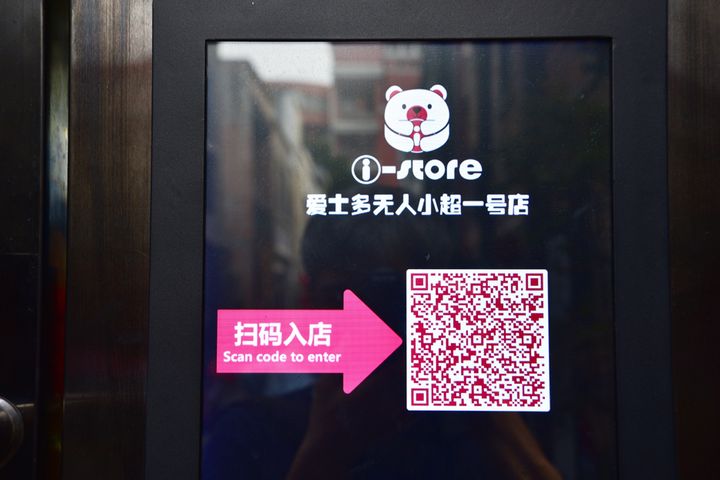 Staffless Stores Start to Stale in China
Staffless Stores Start to Stale in China(Yicai Global) April 2 -- Enthusiasm for the staffless retail sector is starting to wane in China after two years because of immature technical and business systems.
I-store (Guangzhou) Electronic Technology was the first company to enter the autonomous retail sector in South China. It opened its first smart outlet in Guangzhou in October 2017, public information shows.
It has now cut the number of these stores to three from nine at their height in less than a year and a half, Yicai Global learned from a company staffer.
A woman surnamed Lv who lives in the southern megacity recently discovered a shuttered I-store near her home emptied of goods. This was the first unmanned retail outlet in her community. She and her neighbors, who often went there after dinner to buy snacks, entered and paid for goods by scanning different QR codes. This novelty had vanished in just over a year.
Opening each robo-retail outlet is an experimental move for the company and it adjusts the number of its stores based on actual operations, the employee explained.
These shutdowns may be just a matter of time, though these quick marts bring a fresh experience to many, in Lv's view. The outlets lack a variety of goods, with beverages like water and beer and a few daily necessities making up the bulk of their stock, with staples such as rice, noodles, grain and oil unavailable. Many items are also priced above the going rate.
Big Props
The company once boasted it got support from big companies like Amazon, Microsoft, Alibaba Group Holding, Tencent Holdings, Huawei Technologies, Baidu, Google, iFlytek and Alibaba's Alipay payment app when the first store opened in Guangzhou.
The firm formed on Aug. 8, 2017 with a registered capital of CNY50 million (USD7.4 million), company data on business information website Tianyancha shows.
Several hundred of its branches now exist nationwide thanks to the promotion of 30 agents across the country, I-store said at a forum it hosted in Beijing in June.
The sector started to feel the chill last year, however. Robo-retail became a new sector with great investment potential as internet giants such as Amazon, Alibaba and JD.Com entered in 2017. At least 50 startups have broken into it since the second half of 2017. News of these startups' failures has kept popping up since the start of last year.
Xinbianli, a newcomer that raised nearly CNY500 million (USD74.4 million) in 2017, reportedly closed its first convenience stores and cut jobs in various cities on Jan. 10 last year.
Archiving large scale output is impossible for now since the technical and business systems that support the automat retail sector are far from mature, You Tianyu, head of market analytics firm EO Intelligence Research Institute, explained to Yicai Global.
Running normally without human operators is the key to this retail format, and developers cannot reduce operating costs to support reasonable profit margins for now due to high technical costs, You said.
Needing More Hardware
From the supply chain perspective, staffless stores are the same as traditional retail outlets in terms of logistics and distribution. Many robo-outlets operate at losses since they only save on the cost of salesclerks, but do not gain much savings on costs with their higher technological outlays.
Autonomous retail will not be able to turn the corner in the short run, You said.
The platforms' blind expansions are the reason behind their mass closures, Cao Lei, the director at 100EC's Research Center for Electric Commerce, told Yicai Global.
Cooling capital ardor and insufficient custom are the two causes of the shutdown of smart outlets. Consumers will only shop in them at first out of curiosity but will then go back to conventional convenience stores from habit since staffless stores are too complicated.
The entire system in an a robo-retail venue may also crash once one function goes on the blink.
As technology advances, however, autonomous retail will continue to grow by leaps and bounds in future, Cao optimistically projects.
Editor: Ben Armour